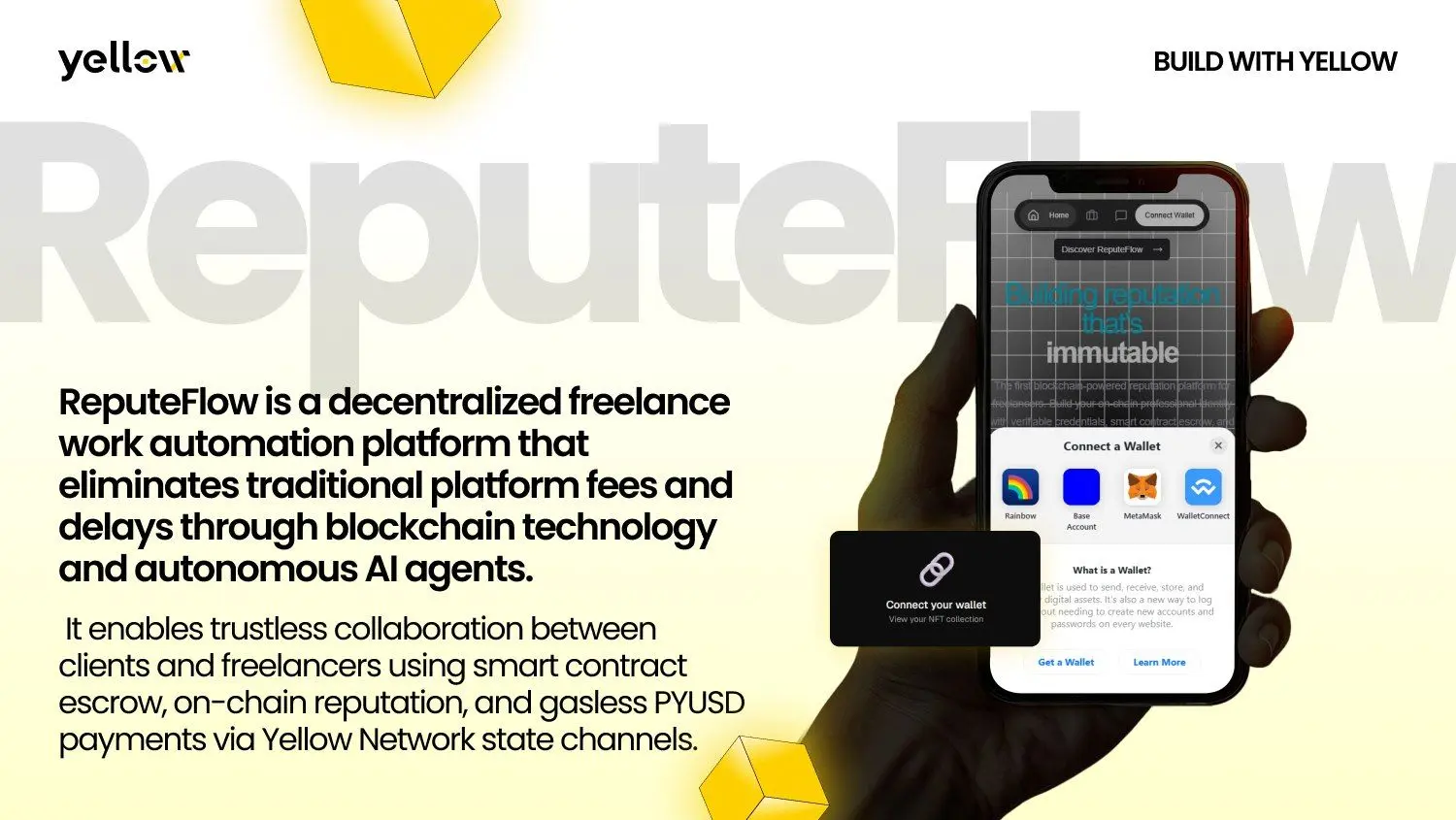ReputeFlow has launched a decentralized freelance work automation platform built on Yellow SDK that eliminates traditional platform fees and payment delays through blockchain technology and autonomous AI agents. The platform, deployed on Base Sepolia testnet, enables trustless collaboration between clients and freelancers using smart contract escrow, on-chain reputation systems, and gasless PYUSD stablecoin payments via Yellow Network state channels.
What to Know:
- ReputeFlow charges zero platform fees and provides instant payments through PYUSD stablecoin, with freelancers keeping 100% of earnings while clients pay all gas fees
- The platform uses autonomous AI agents that understand natural language commands to automate job posting, proposal evaluation, and payment processing without requiring cryptocurrency expertise
- Smart contract escrow on Base Sepolia protects funds for both parties, with payments released instantly upon approval and dispute resolution mechanisms built into the contracts
The platform operates through a three-step setup process. Users connect Web3 wallets such as MetaMask to Base Sepolia testnet, obtain test tokens from Alchemy and Circle faucets, then immediately begin posting jobs or registering freelance skills. The Base Sepolia network operates on Chain ID 84532 and can be explored through sepolia.basescan.org.
Yellow SDK, the underlying development framework powering ReputeFlow, serves as a high-performance, chain-agnostic toolkit designed to bridge traditional Web2 and emerging Web3 development practices. The toolkit abstracts away blockchain complexity by providing a single integration layer that handles chain-specific logic, allowing developers to build blockchain-powered applications with the speed and simplicity of traditional Web2 development. Yellow SDK offers multi-chain compatibility and enables off-chain execution for real-time interactions, addressing latency challenges that have historically plagued Web3 user experience.
Client users post jobs through conversational AI commands.
The system accepts natural language instructions such as "post a job for Smart Contract Dev budget:20$ skills:solidity,rust" and automatically creates on-chain job listings with funds deposited to escrow. Freelancers submit proposals reviewed through dashboard interfaces, and clients approve deliverables using simple commands like "approve deliverable for job 23." PYUSD releases to freelancers instantly with zero platform fees.
Freelancers register skills by communicating with AI agents using phrases like "register my skills solidity rust python."
The platform's job matcher automatically identifies relevant opportunities based on registered skill sets and provides match scores for each listing. Applied work submitted through the system triggers instant PYUSD payment upon client approval, with no waiting periods and all gas fees covered by clients rather than freelancers.
In order to do that, the platform deploys three distinct autonomous AI agents.
Client agents handle job posting, proposal evaluation, and payments.
Freelancer agents discover jobs and generate proposals. Job matchers connect freelancers with relevant opportunities based on skill compatibility. This automation removes the need for users to understand blockchain mechanics or cryptocurrency protocols.
Smart contract escrow on Base Sepolia provides security guarantees for both parties. Client funds lock in escrow until deliverable approval, with dispute options available for unsatisfactory work.
Freelancers receive guaranteed payment once work gains approval, eliminating chargeback risks and payment delays common in traditional freelance platforms.
PayPal USD stablecoin integration provides payment stability. The USD-pegged stablecoin eliminates cryptocurrency volatility while maintaining instant settlement and low transaction fees backed by PayPal infrastructure.
Clients deposit PYUSD held in smart contracts, which releases to freelancers instantly upon approval.
The platform builds portable on-chain reputation through immutable project records, client quality ratings, skill-based NFT badges, and credentials that transfer across platforms. This reputation system creates verifiable professional identities stored on decentralized networks rather than controlled by centralized platforms.
ReputeFlow currently operates exclusively on Base Sepolia testnet for testing and demonstration purposes. The development team plans mainnet deployment for Q2 2025. Users pay only blockchain gas fees, which remain minimal on Base Sepolia, with the platform charging zero platform fees for transactions.
Closing Thoughts
ReputeFlow demonstrates how blockchain infrastructure can eliminate traditional freelance platform fees while automating workflows through AI agents. The platform's use of Yellow SDK, smart contract escrow, and PYUSD payments creates a trustless system where freelancers retain full earnings and clients receive payment guarantees. Mainnet launch in Q2 2025 will determine whether the decentralized model can compete with established freelance marketplaces.



